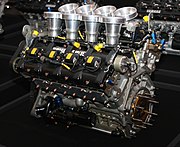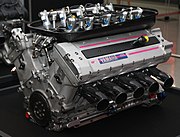Yamaha F1 engine
Appearance
| Yamaha F1 engine | |
|---|---|
 Yamaha OX10A 3.5L V10 F1 engine (1993) | |
| Overview | |
| Manufacturer | |
| Production | 1989–1997 |
| Layout | |
| Configuration | 75° V8; 70° V12; 72° V10 |
| Displacement |
|
| Cylinder bore |
|
| Piston stroke |
|
| Combustion | |
| Fuel system | Electronic fuel injection |
| Fuel type | Gasoline |
| Cooling system | Water-cooled |
| Output | |
| Power output | 560–700 hp (418–522 kW; 568–710 PS)[1] |
| Torque output | 290–305 lb⋅ft (393–414 N⋅m)[2] |
| Chronology | |
| Predecessor | Yamaha OX77 |
Yamaha developed a number of naturally-aspirated racing engines during their time in Formula One; between 1989 and 1997. They initially supplied engines for the Zakspeed team, in 1991 for the Brabham BT60Y, in 1992 for the Jordan 192, from 1993 to 1996 for Tyrrell, and in 1997 for the Arrows A18. These never won a race (Damon Hill nearly did so at the 1997 Hungarian Grand Prix), but drivers including Damon Hill, Ukyo Katayama, Mark Blundell and Mika Salo scored some acceptable results with them. However, their engines were often unreliable and were usually regarded as not very powerful.[1][3]
Gallery
[edit]See also
[edit]- Renault RS engine
- Ferrari V10 engine
- Mercedes-Benz FO engine
- BMW E41 / P80 engine
- Honda V10 engine
- Toyota RVX engine
- Peugeot V10
References
[edit]- ^ a b "Engine Yamaha • STATS F1". statsf1.com. Retrieved 2021-10-10.
- ^ "Spicer Horsepower and Torque Calculator".
- ^ Yamaha Motor Co., LTD. "Our Stories:24 Taking on Formula One—the Apex of Auto Racing". global.yamaha-motor.com. Retrieved 2021-10-10.



